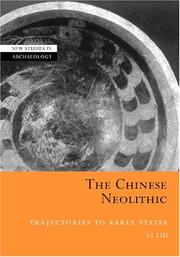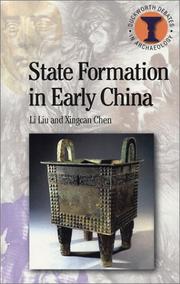| Listing 1 - 10 of 47 | << page >> |
Sort by
|

ISBN: 0521811848 0521010640 1107132711 0511170653 0511080565 0511331266 0511489625 1280419598 0511206593 051107980X 9780511080562 9780511489624 9780511079801 9781280419591 9786610419593 6610419590 9780521811842 9780521010641 Year: 2004 Volume: *28 Publisher: Cambridge : Cambridge University Press,
Abstract | Keywords | Export | Availability | Bookmark
 Loading...
Loading...Choose an application
- Reference Manager
- EndNote
- RefWorks (Direct export to RefWorks)
This book studies the formation of complex societies in prehistoric China during the Neolithic and early state periods, c. 7000-1500 BC. Archaeological materials are interpreted through anthropological perspectives, using systematic analytic methods in settlement and burial patterns. Both agency and process are considered in the development of chiefdoms and in the emergence of early states in the Yellow River region. Interrelationships between factors such as mortuary practice, craft specialization, ritual activities, warfare, exchange of elite goods, climatic fluctuations, and environmental changes are emphasized. This study offers a critical evaluation of current archaeological data from Chinese sources, and argues that, although some general tendencies are noted, social changes were affected by multiple factors in no pre-determined sequence. In this most comprehensive study to date, Li Liu attempts to reconstruct developmental trajectories toward early states in Chinese civilization and discusses theoretical implications of Chinese archaeology for the understanding of social evolution.
Antiquities, Prehistoric --- Neolithic period --- Prehistoric antiquities --- Prehistoric archaeology --- Prehistory --- Prehistoric peoples --- China --- Antiquities. --- Antiquities [Prehistoric ] --- Antiquities --- Social Sciences --- Archeology
Book
ISBN: 1484337727 1484337700 Year: 2018 Publisher: Washington, D.C. : International Monetary Fund,
Abstract | Keywords | Export | Availability | Bookmark
 Loading...
Loading...Choose an application
- Reference Manager
- EndNote
- RefWorks (Direct export to RefWorks)
In 2009, the United Kingdom changed from a worldwide to a territorial tax system, abolishing dividend taxes on foreign repatriation from many low-tax countries. This paper assesses the causal effect of territorial taxation on real investments, using a unique dataset for multinational affiliates in 27 European countries and employing the difference-in-difference approach. It finds that the territorial reform has increased the investment rate of UK multinationals by 15.7 percentage points in low-tax countries. In the absence of any significant investment reduction elsewhere, the findings represent a likely increase in total outbound investment by UK multinationals.
Investments, Foreign. --- Capital exports --- Capital imports --- FDI (Foreign direct investment) --- Foreign direct investment --- Foreign investment --- Foreign investments --- International investment --- Offshore investments --- Outward investments --- Capital movements --- Investments --- Investments: General --- Labor --- Money and Monetary Policy --- Taxation --- Corporate Taxation --- Business Taxes and Subsidies --- Multinational Firms --- International Business --- Corporate Finance and Governance: General --- Personal Income and Other Nonbusiness Taxes and Subsidies --- Wages, Compensation, and Labor Costs: General --- Investment --- Capital --- Intangible Capital --- Capacity --- Monetary Systems --- Standards --- Regimes --- Government and the Monetary System --- Payment Systems --- Public finance & taxation --- Corporate & business tax --- Labour --- income economics --- Macroeconomics --- Monetary economics --- Dividend tax --- Corporate income tax --- Wages --- Private investment --- Currencies --- Taxes --- National accounts --- Money --- Income tax --- Corporations --- Saving and investment --- Germany --- Income economics
Book
Year: 1999 Publisher: Brussel VUB
Abstract | Keywords | Export | Availability | Bookmark
 Loading...
Loading...Choose an application
- Reference Manager
- EndNote
- RefWorks (Direct export to RefWorks)
Multi
ISBN: 9789819919918 9789819919901 9789819919925 9789819919932 Year: 2023 Publisher: Singapore Springer Nature
Abstract | Keywords | Export | Availability | Bookmark
 Loading...
Loading...Choose an application
- Reference Manager
- EndNote
- RefWorks (Direct export to RefWorks)
This book provides a unique perspective on atom economical utilization of biomass resources into value-added productions. Humins are inevitably formed during the process of biomass conversion, which compete with desired products, restrain the activity of catalyst and hinder the recycling of catalyst and separation of products. To further improve the efficiency of biomass conversion toward downstream products, unambiguous elucidation of the chemical structure and formation mechanism of humins are prerequisite. This book primarily presents the chemical structure analysis and formation mechanism of various biomass-derived humins, from simple molecular models to raw biomass resources. The chemical similarities and differences of various biomass-derived humins have been systematically summarized according to advanced analytical interpretation, which offers a comprehensive viewpoint for readers with chemistry, engineering and material backgrounds. Furthermore, the progress that has been achieved on humins valorization and future perspectives are discussed. Given its scope, this book can be treated as an informative resource for undergraduates, postgraduates, lecturers and researchers interested in biomass conversion from academia and industry from entry to professional levels.
General ecology and biosociology --- Materials sciences --- Environmental protection. Environmental technology --- materiaalkennis --- environment --- ecologie --- milieutechnologie --- Biomass chemicals. --- Humin.

ISBN: 0715632248 Year: 2003
Abstract | Keywords | Export | Availability | Bookmark
 Loading...
Loading...Choose an application
- Reference Manager
- EndNote
- RefWorks (Direct export to RefWorks)
Book
ISBN: 9780521644327 9780521643108 9781139015301 9781139421409 1139421409 9781139423458 1139423452 1139015303 1139419366 9781139419369 0521643104 0521644321 9781139419369 1139417312 9781139417310 110722442X Year: 2012 Volume: *22 Publisher: Cambridge ; New York : Cambridge University Press,
Abstract | Keywords | Export | Availability | Bookmark
 Loading...
Loading...Choose an application
- Reference Manager
- EndNote
- RefWorks (Direct export to RefWorks)
This book explores the roles of agricultural development and advancing social complexity in the processes of state formation in China. Over a period of about 10,000 years, it follows evolutionary trajectories of society from the last Palaeolithic hunting-gathering groups, through Neolithic farming villages and on to the Bronze Age Shang dynasty in the latter half of the second millennium BC. Li Liu and Xingcan Chen demonstrate that sociopolitical evolution was multicentric and shaped by inter-polity factionalism and competition, as well as by the many material technologies introduced from other parts of the world. The book illustrates how ancient Chinese societies were transformed during this period from simple to complex, tribal to urban, and preliterate to literate.
S17/0211 --- China: Art and archaeology--Archaeology: Prehistory --- Antiquities, Prehistoric --- Archaeology --- Prehistoric peoples --- Archeology --- Anthropology --- Auxiliary sciences of history --- History --- Antiquities --- Prehistoric antiquities --- Prehistoric archaeology --- Prehistory --- Social Sciences
Book
ISBN: 1475591306 9781475591309 1475591179 9781475591170 1475591241 Year: 2017 Publisher: Washington, D.C. : International Monetary Fund,
Abstract | Keywords | Export | Availability | Bookmark
 Loading...
Loading...Choose an application
- Reference Manager
- EndNote
- RefWorks (Direct export to RefWorks)
With growing academic and policy interest in research and development (R&D) tax incentives, the question about their effectiveness has become ever more relevant. In the absence of an exogenous policy reform, the simultaneous determination of companies’ tax positions and their R&D spending causes an identification problem in evaluating tax incentives. To overcome this identification challenge, we exploit a U.K. policy reform and use the population of corporation tax records that provide precise information on the amount of firm-level R&D expenditure. Using difference-in-differences and other panel regression approaches, we find a positive and significant impact of tax incentives on R&D spending, and an implied user cost elasticity estimate of around -1.6. This translates to more than a pound in additional private R&D for each pound foregone in corporation tax revenue.
Finance, Public. --- Cameralistics --- Public finance --- Public finances --- Currency question --- Corporate Finance --- Personal Finance -Taxation --- Public Finance --- Taxation --- Business Taxes and Subsidies --- Taxation, Subsidies, and Revenue: General --- Personal Income and Other Nonbusiness Taxes and Subsidies --- Corporate Finance and Governance: General --- National Government Expenditures and Related Policies: General --- Public finance & taxation --- Ownership & organization of enterprises --- Tax incentives --- Tax allowances --- Small and medium enterprises --- Marginal effective tax rate --- Expenditure --- Taxes --- Economic sectors --- Tax policy --- Income tax --- Small business --- Tax administration and procedure --- Expenditures, Public --- United Kingdom
Book
ISBN: 9787101055177 Year: 2007 Publisher: Beijing : Zhong hua shu ju,
Abstract | Keywords | Export | Availability | Bookmark
 Loading...
Loading...Choose an application
- Reference Manager
- EndNote
- RefWorks (Direct export to RefWorks)
Book
Year: 2019 Publisher: Washington, D.C. : International Monetary Fund,
Abstract | Keywords | Export | Availability | Bookmark
 Loading...
Loading...Choose an application
- Reference Manager
- EndNote
- RefWorks (Direct export to RefWorks)
A growing empirical literature has documented significant profit shifting activities by multinationals. This paper looks at the impact of such profit shifting on real activity and tax competition. Real activity can be affected as profit shifting changes—and theoretically most likely reduces—the cost of capital. Tax competition, even over real capital, is affected, because a permissive attitude toward profit shifting can be seen as a selective tax reduction for multinationals. Tightening profit shifting rules in turn can affect tax competition through the main rate. This paper discusses these issues theoretically and with the help of a simulation to assess the impact of profit-shifting on investment, revenues, and government behavior. Using the theoretical framework, it also provides a brief overview of the related empirical literature.
Public Finance --- Taxation --- Corporate Taxation --- Taxation, Subsidies, and Revenue: General --- Business Taxes and Subsidies --- Public finance & taxation --- Corporate & business tax --- Thin capitalization rules --- Transfer pricing rules --- Corporate income tax --- Anti-avoidance rules --- Revenue administration --- Taxes --- Double taxation --- Corporations --- Revenue --- United States
Book
Year: 2022 Publisher: Washington, D.C. : International Monetary Fund,
Abstract | Keywords | Export | Availability | Bookmark
 Loading...
Loading...Choose an application
- Reference Manager
- EndNote
- RefWorks (Direct export to RefWorks)
In 2009, the United Kingdom abolished the taxation of profits earned abroad and introduced a territorial tax system. Under the territorial system, firms have strong incentives to shift profits abroad. Using a difference-in-differences research design, we show that the profitability of UK subsidiaries in low-tax countries increased after the reform compared to subsidiaries of non-UK multinationals in the same countries by an average of 2 percentage points. This increase in profit shifting also leads to increases in measured productivity of the foreign affiliates of UK multinationals of between 5 and 9 percent.
Macroeconomics --- Economics: General --- Production and Operations Management --- Corporate Finance --- Corporate Taxation --- Labor --- Business Taxes and Subsidies --- International Fiscal Issues --- International Public Goods --- Multinational Firms --- International Business --- Production --- Cost --- Capital and Total Factor Productivity --- Capacity --- Aggregate Factor Income Distribution --- Wages, Compensation, and Labor Costs: General --- Economic & financial crises & disasters --- Economics of specific sectors --- Multinationals --- Corporate & business tax --- Labour --- income economics --- Public finance & taxation --- Total factor productivity --- Transnational corporations --- Economic sectors --- Corporate income tax --- Taxes --- Income --- National accounts --- Wages --- Currency crises --- Informal sector --- Economics --- Industrial productivity --- International business enterprises --- Corporations --- Taxation --- United Kingdom
| Listing 1 - 10 of 47 | << page >> |
Sort by
|

 Search
Search Feedback
Feedback About UniCat
About UniCat  Help
Help News
News